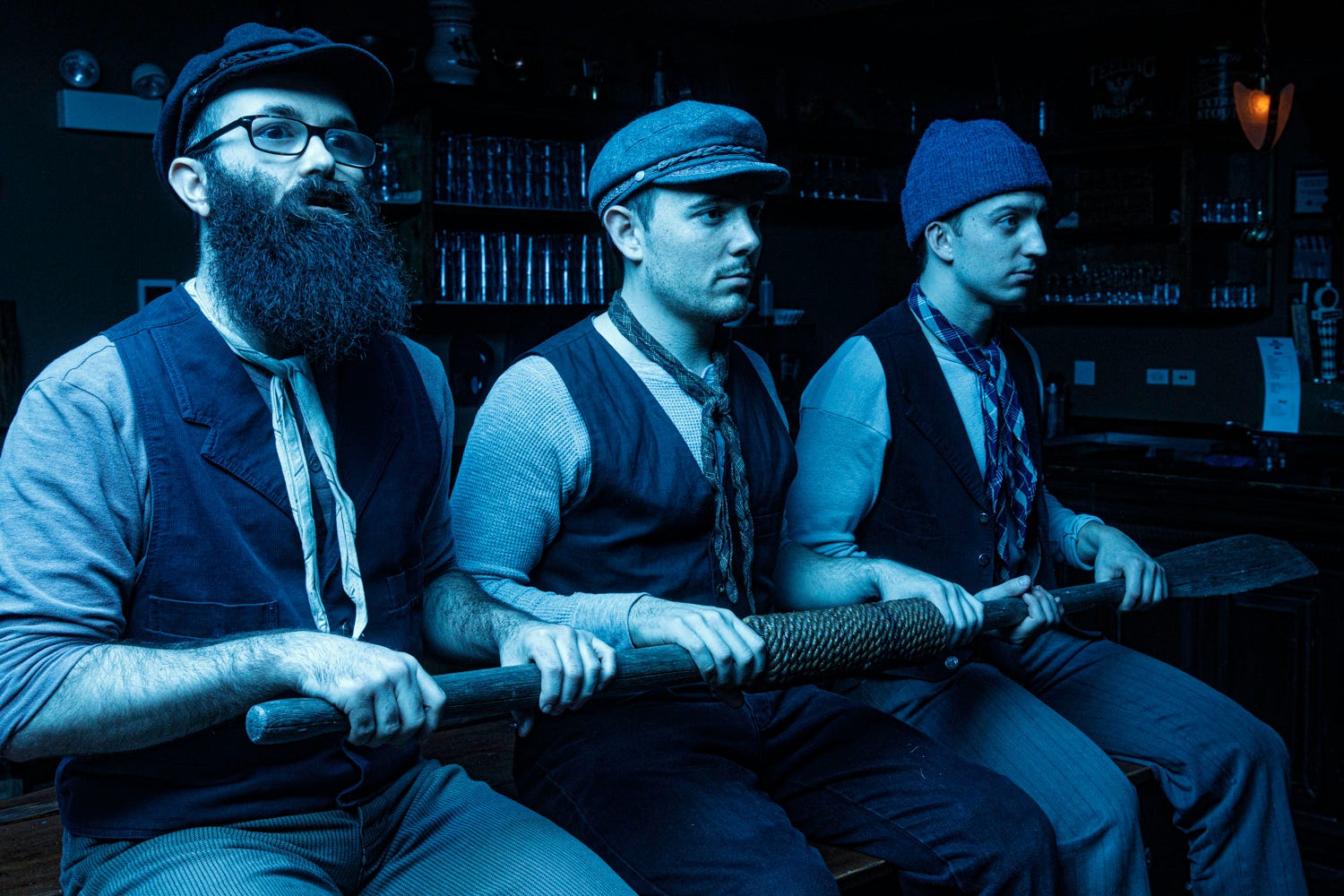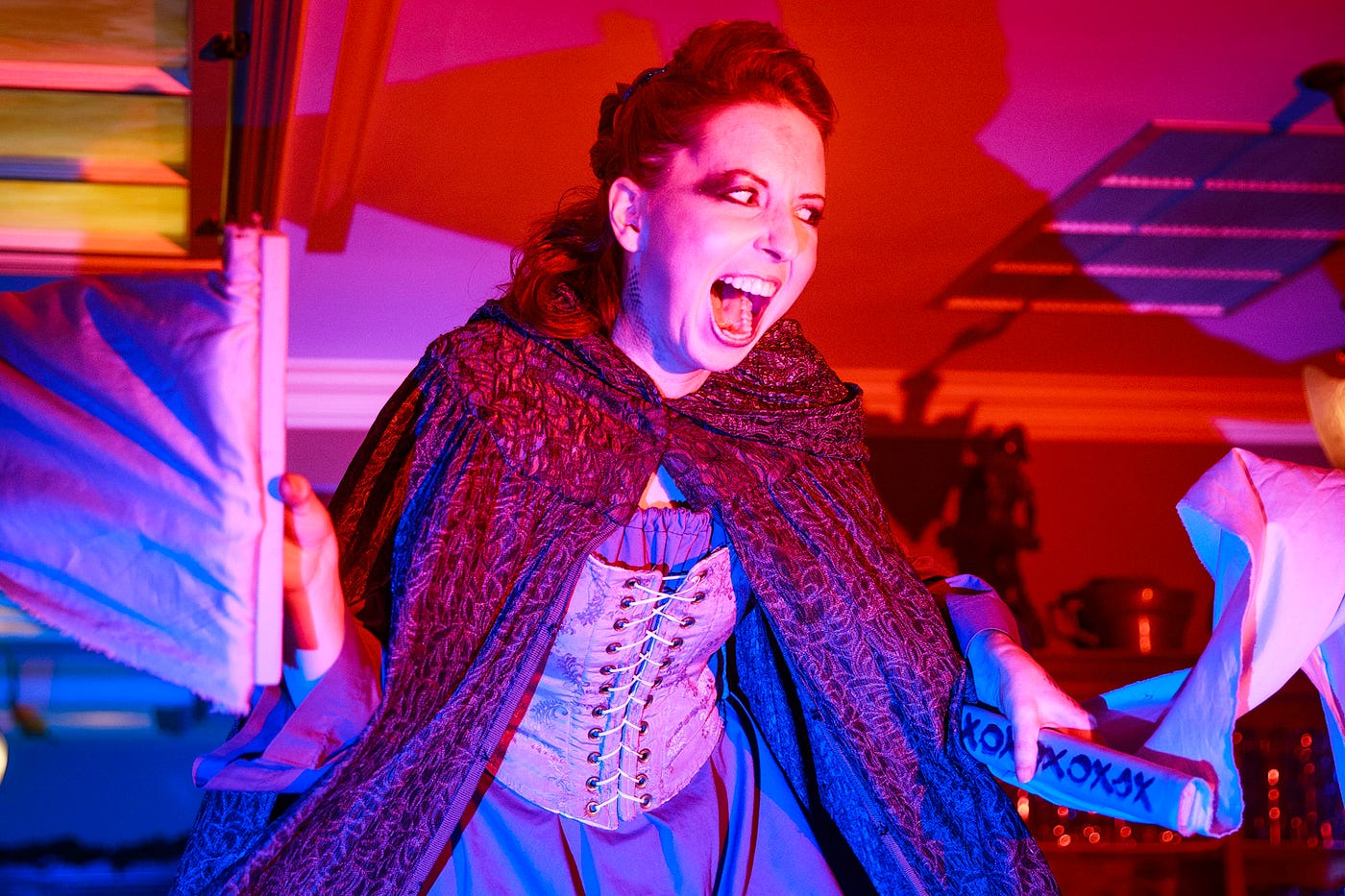‘The Ode at Pint’s End’ is a Lively, Haunting Voyage (Review)
Birch House Immersive’s latest show captures life on the sea in the 1860s


At a young age, I learned the importance of respecting the sea. I had poor breathing habits growing up, so when swimming in the Atlantic Ocean on a family vacation, getting trapped under a massive wave was terrifying. As the surface of the wave moved towards land, the water underneath rushed back out to sea, spinning me around, losing all sense of direction. Images of the video game characters I’d seen drowning flashed through my mind, allowing panic to set in. I raced to the top of the water, or, what I’d hoped was the top. Breaking through the surface, gasping for air, was liberating and freeing.
But after swimming back to shore for a break, I’d find myself foolishly back out in the ocean, any previous experience forgotten. Why do we keep returning to the sea knowing how dangerous it can be? Is it a primal urge within us, the waves beckoning us to return home? Or, are we like my youthful self, curious to play and explore, even without full mastery of the water? It’s these questions that Birch House Immersive’s latest production The Ode At Pint’s End explores, through the foreboding experiences of those doomed and foolish enough to live on the sea, while bringing the audience along for a dynamic and moving tale.
My journey to Pint’s End starts on foot, as I live within a short walking distance of Ms. Murphy’s & Son’s Irish Bistro in North Center. I’ve never been to Ms. Murphy’s when it wasn’t loud and boisterous, with sports of all kinds blaring from televisions; tonight is no exception. But instead of taking a seat, I’m guided through a door and up a long flight of stairs, arriving at The Broken Oar pub, established in 1864. In the pub, the rock and roll music, yuppies, and televisions are gone, replaced with a live three-person band, hardworking sailors and their partners, and free-flowing stories.
In wandering around the pub, I’m quickly befriended by Eamonn (Eddie Lynch), who’s a pint or two — or probably further — ahead of everyone else. Eamonn vividly, with slurring words, paints a picture of what life’s like for the regular patrons of the pub. But when pressed for details on their sailing experiences, a dark look flashes across his face; he quickly elects to bring someone else into our conversation, leaving the topic dead in the water.

As Eamonn and the others chat, a shadowy figure across the room catches my eye, the slightest of hand motions beckoning me closer. I’m drawn to them and they pull me into a small, darkened room. This person (or rather this mystical creature, who I would later come to know as The Dark, played by Collin Quinn Rice) presses me for details on what Eamonn’s told me. After conveying what I know, The Dark pulls me close, warning, or perhaps pleading, not to trust what Eamonn says, before releasing me back into the pub. While a lively time is being had on the surface tonight, trouble is clearly brewing underneath.
The band is finishing their set but before the last song, the leader breaks down what to expect for the next 90 minutes: how best to play, or not play (based on your preference), in The Ode at Pint’s End. With fresh beers and the song’s end, the audience learns it’s the one-year anniversary of a terrible ordeal: Eamonn and two other sailors barely surviving being lost at sea. In rehashing the details, doubts of what really happened resurface from the sailor’s wives, pressing the sailors for the real story. And between the wives’ nagging and the weight of the anniversary, the sailors crack, with details pouring forth from the past.
Get Patrick B. McLean’s stories in your inbox
Join Medium for free to get updates from this writer.
SubscribeSubscribe
Creators Lauren N. Fields and Janie Killips have crafted the narrative of The Ode at Pint’s End to mirror the oral structure of stories as told in bars to pass long nights away. The action flashes back and forth between past and present with comments and interruptions, similar to how you might interrupt a friend telling a story if they start forgetting key details. This structure makes the story of The Ode at Pint’s End feel alive, a character itself. If I was sitting down, I’d be on the edge of my stool, leaning in closely to the sailors’ tale, wanting to miss no detail uttered.

Additionally Pint’s End reveals itself to be a spirited musical. My guess is that at least half of the experience is told through song and dance. It adds a majestic layer to the sailors’ stories, which are already filled with magical, otherworldly elements; the audience provides stomps and claps alongside the band’s songs. The Dark and two other mystical creatures glide around the space, singing and dancing, as if moving through the sea itself with grace and ease. And with the addition of a few well-placed stage hands with rich blue lights, not only does the audience feel “lost at sea” with the sailors, they’re a part of the story itself, breathing life into it.
The challenges the sailors go through are moving and relatable, their struggles worn on their sleeves, as they reach their breaking points. They’re simple men, trying to make an honest living for their families. At the end, in order to overcome the magical elements, the audience is asked to share, quietly, something personal following the sailors’ lead. By shedding the burden I've been carrying, I’m part of the crew now; I’m in it with the sailors, ready to return home to what I cherish most, a rich emotion, multiplied by the holiday season.
But it’s my relationship with the characters of Pint’s End where there’s a slight crack in the hull, water slowly seeping in. The audience’s role in Pint’s End changes a few times. While it is always clearly defined from moment to moment, allowing me to easily adjust, it prevents me from having a centralized, complete arc. We set sail as local bar patrons when Pint’s End’s journey begins but we return to the bar in a completely different role. While the story has a rewarding and moving resolution, I wished to have been changed by the journey because I was moved to be, not because the narrative did so for me.
Even with my agency shifting with the tides, it felt like there was always something I could invest in while at sea in The Ode at Pint’s End, feeling like I too had a worthwhile detail to provide when recounting the tale over a pint. The course set by Birch House Immersive shows that not only do they respect the stories of the sea, but, indeed, they’ve mastered them.
The Ode at Pint’s End runs through December 15 in Chicago, IL. Tickets are $40.
NoPro is a labor of love made possible by our generous Patreon backers. Join them today!
In addition to the No Proscenium web site, our podcast, and our newsletters, you can find NoPro on Twitter, Facebook, YouTube, Instagram, in the Facebook community Everything Immersive, and on our Slack forum.
Office facilities provided by Thymele Arts, in Los Angeles, CA.